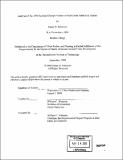Analysis of the 1966 Summer Olympic Games on real estate markets in Atlanta
Author(s)
Simmons, Susan M. (Susan Marie), 1970-
DownloadFull printable version (9.203Mb)
Other Contributors
Massachusetts Institute of Technology. Dept. of Urban Studies and Planning.
Advisor
William C. Wheaton.
Terms of use
Metadata
Show full item recordAbstract
Among all sporting events, the Summer Olympic Games are the most watched event around the globe. Global participation, diversity of events and sheer athletic skill attract billions of viewers to the seventeen-day summer event. The increasing interest in the Games has only served to promote greater commercialism for the event; and for the host city, greater opportunities to showcase itself to future business and leisure travelers. The recent bribery scandal involving the Salt Lake City, Utah bid committee demonstrates the lengths at which some cities have gone to win an Olympic host bid. In contrast with the situation over twenty years ago where the City of Los Angeles was the only bidder for the 1984 Games, sixty-six cities expressed their interest in hosting the 2008 Summer Games. Why is there such intense interest in winning a bid to host the Olympic Games? What are the real payoffs from hosting this event? Do the benefits outweigh the tremendous costs for the host city? Does the significant one-time investment produce long-term economic gains? This study does not attempt to answer all of these questions at this time. Instead, the focus of this study is to understand how these questions apply to one particular host city, the City of Atlanta, Georgia, host of the 1996 Summer Olympic Games. In particular, this study measures the long-term impacts on real estate markets in Atlanta through both quantitative analysis of economic variables and qualitative analysis of the physical, organizational and psychological impacts. In contrast with the two previous host cities, Barcelona and Seoul, that spent many billions of public and private (but mostly public) dollars transforming their city in preparation for the Games, Atlanta relied upon primarily private funds to prepare for the 1996 Games. Public funds were spent for some important infrastructure improvements, but these investments would have likely taken place at some future point without the Games. Even so, within a five year period, more than $2 to 3 billion was spent to prepare Atlanta for the Games. This study determines that this Olympic investment had minimal impact on the fast-growing regional market. In most cases, the Olympics were no more significant than other factors, such as corporate expansion and relocation, in contributing to long-term economic growth. In the local in-town markets, the Olympics did meaningfully contribute to growth in the multi-family sector. In addition to new and renovated sports facilities, the Olympics left downtown Atlanta with many notable legacies that are fueling urban growth and revitalization: a new 21 acre park, renovated parks and public plazas, new street lighting, tree plantings, and other streetscape improvements, 9000 units of student housing, and thousands of new residents living in converted buildings downtown. The Olympics may not have transformed Atlanta to the extent they did in Barcelona and areas of Seoul; however, it certainly proved to be a catalyst for many important changes in the city today.
Description
Thesis (S.M.)--Massachusetts Institute of Technology, Dept. of Urban Studies and Planning, 2000. Includes bibliographical references (leaves 106-112).
Date issued
2000Department
Massachusetts Institute of Technology. Department of Urban Studies and PlanningPublisher
Massachusetts Institute of Technology
Keywords
Urban Studies and Planning.